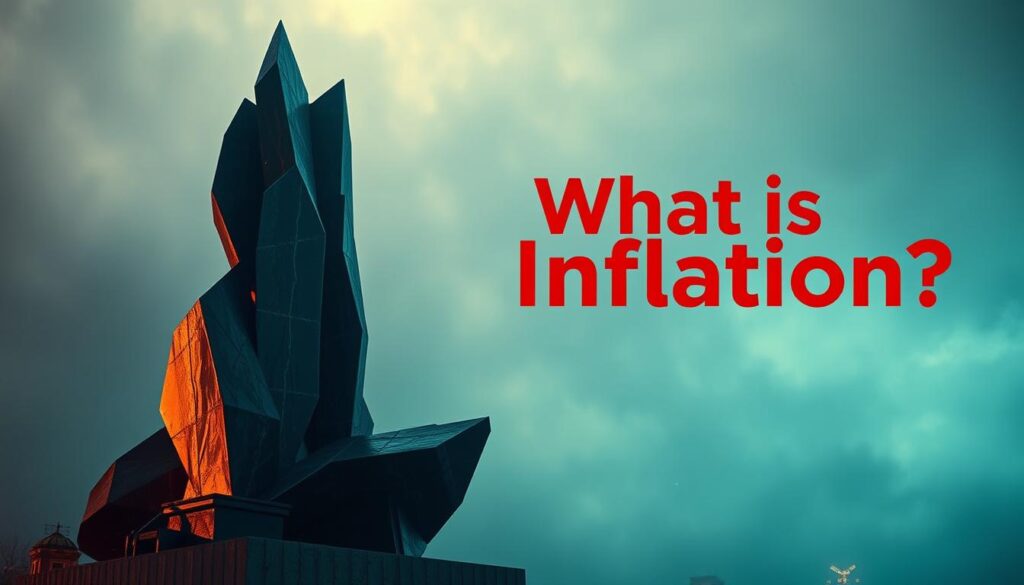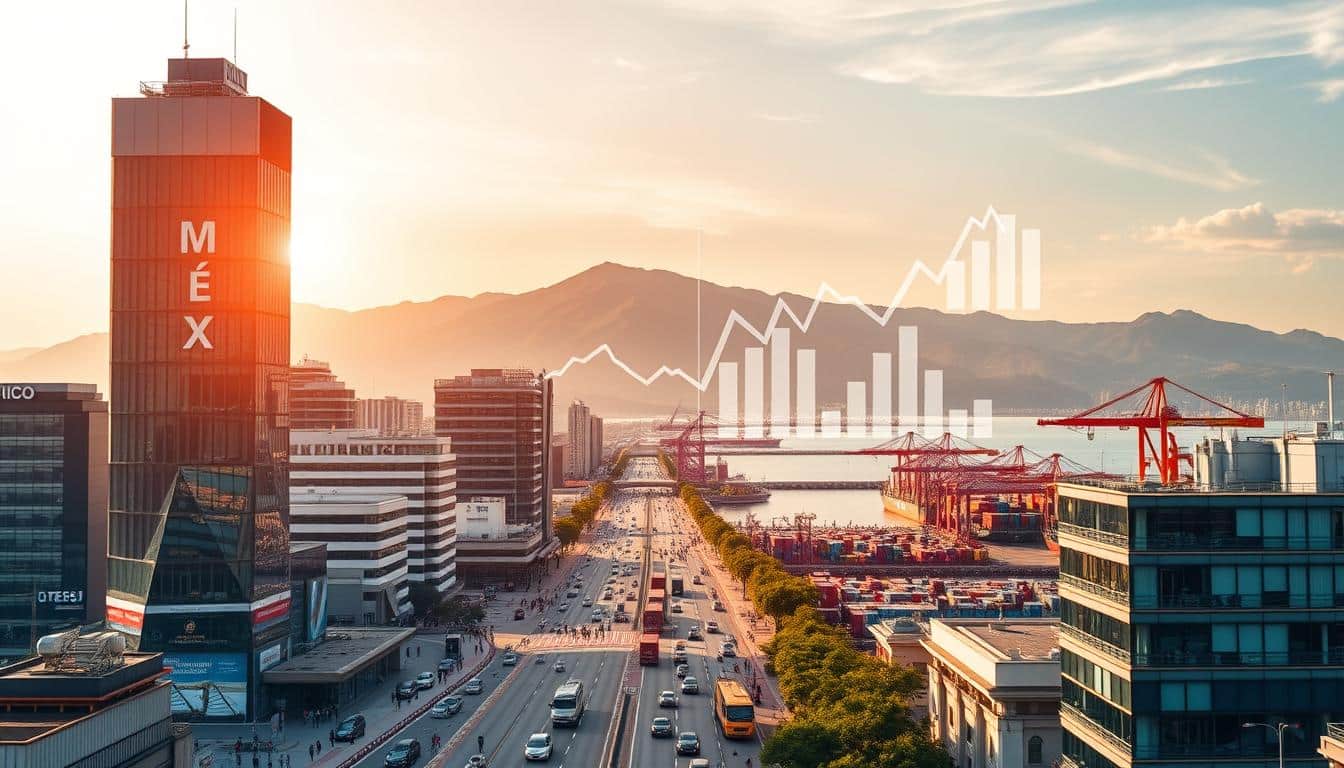Inflation has a big impact on South Africa’s economy. It means prices for things go up, making money worth less. This makes it harder for people to buy what they need. Knowing about inflation helps people plan how to spend their money better.
It also plays a role in decisions about investments and the health of the economy. So, understanding inflation is key for financial well-being.
Anúncios
What is Inflation?
Inflation is a key economic idea. It affects many parts of an economy. Knowing what inflation means and why it’s key helps everyone. This includes regular folks, investors, and those making policies. In short, inflation means prices for things go up. This makes what you can buy with money go down as time passes. This drop changes how people spend, save, and invest. So, understanding inflation is crucial.
Definition and Importance
Inflation is about prices going up and money’s value dropping. Its impact on how we make money choices is big. High inflation can make people want to spend less and save less. But, if inflation is low, it might boost the economy. Knowing trends in inflation can aid in planning finances better. It helps consumers and businesses deal with changes.
How Inflation is Measured
Different signs help gauge inflation. The Consumer Price Index, or CPI, is the main tool used. CPI keeps an eye on prices for a mix of goods and services. This tells us about buying power and how prices shift over time. Getting how inflation is measured helps people understand economic shifts better.

Current Trends in South African Inflation
South Africa’s inflation landscape shows notable trends that impact the country. The inflation rate now is 5.20%. Experts expect it to drop slightly to 5.10% next quarter. This information helps us understand the current economic situation and what it means for people and companies.
Recent Statistics
There’s been a decrease in South Africa’s inflation rates recently, unlike the high rates seen before. Better supply chain management and effective monetary policies have helped lower inflation.
Factors Influencing Inflation Rates
It’s important to know what causes these inflation changes to understand the economy better. These are the main factors:
- Commodity prices, which directly impact the costs of goods and services.
- Currency fluctuations that affect import costs and overall economic stability.
- Economic policies, including interest rates set by the South African Reserve Bank, designed to manage inflation.
These factors are key in determining the direction of inflation trends. It’s vital for those involved to stay updated on these issues.
Historical Overview of Inflation in South Africa
In South Africa, inflation has changed a lot over the years. These changes give us a peek into what affects the economy and people’s lives. Big economic events have had a huge impact, causing prices to go up or down over time.
Inflation Rates in the Past Decades
For many years, South Africa has seen both high and low inflation. In the late 1970s and early 1980s, inflation was really unpredictable, mainly because of global oil prices changing a lot. By the 1990s, things started to even out, but there were still ups and downs because of politics and other economic factors.
- In the early 2000s, inflation rates went down a lot, thanks to better control over money.
- The 2008 global financial crisis made inflation jump again because things cost more to make.
- Lately, inflation has been up and down, affected by policies in South Africa and the world economy.
Key Economic Events Impacting Inflation
Some big events have really left their mark on inflation in South Africa. The end of apartheid in the early 1990s was a huge deal, leading to new economic policies. Other factors, like changes in global commodity prices and trade policies, have also played a role. The South African Reserve Bank has been adjusting its strategies to keep inflation in check over the years.
Understanding Inflation and Its Implications for Daily Life
Inflation impacts our daily life a lot, especially in South Africa. Here, rising prices change how people spend their money. Knowing how inflation works is important. It affects what we can buy, save, and invest for the future. This knowledge helps us get ready for financial ups and downs.
Effects on Purchasing Power
Inflation makes our money worth less. This means we can’t buy as much as we used to. We have to change how we spend. Here’s what happens:
- Basic needs cost more, making it harder for families to manage.
- People might choose necessities over extras, changing how they live.
- Plans like schooling or getting a house might need to wait because things cost more.
Impact on Savings and Investments
Inflation also affects savings. Saving money is key to reach our goals, but inflation can lower what we earn from savings or bonds. Here are some tips:
- Investing in things like stocks or property could beat inflation.
- Think about how much risk you can take when investing during inflation.
- Spreading out investments can help protect against inflation’s downsides.
Inflation’s Impact on Currency Value
Inflation greatly influences a country’s currency value. In South Africa, increased inflation has caused the Rand to lose value. When inflation rises, the Rand’s buying power drops. This makes it weaker against stronger currencies.
Currency devaluation impacts more than just exchange rates. Expatriates sending money home find their contributions have decreased in value. This reduces the purchasing power in South Africa. This situation clearly shows how inflation affects currency. It presents troubles for families depending on these funds.
Learning about currency devaluation and inflation in South Africa is crucial. It helps people understand the financial challenges of living with a changing Rand. This knowledge is key to handling their economic conditions.
Comparison of South African Inflation with Global Rates
Looking into South Africa’s inflation rates and comparing them to the global scene sheds light for both shoppers and policy makers. Although South Africa’s inflation rate might seem average, especially when you think about places with really high inflation, the situation is quite different in emerging markets compared to developed countries. It’s crucial to notice these differences to fully understand what they mean for the economy.
Inflation in Emerging vs Developed Economies
In places like South Africa, inflation rates are usually higher than in more developed areas. A few reasons stand behind this difference:
- Monetary Policy: Emerging countries’ central banks might choose different tactics for inflation, which affects how stable the economy is.
- Economic Stability: Countries with well-established economies usually do a better job at keeping inflation under control thanks to their stability.
- External Influences: Things happening around the world, like changes in the price of goods, often hit emerging markets harder.
This comparison between global inflation and South Africa’s situation shows how local policies are shaped by what’s happening worldwide. Getting to grips with these comparisons helps in making smarter plans, whether you’re an individual or part of a government.
Monetary Policy and Inflation Targeting in South Africa
Monetary policy is key to keeping inflation in check and ensuring economic stability in South Africa. Since 2000, the country has focused on managing inflation to support economic growth. This means aiming for steady price increases. The inflation targeting framework helps in creating effective strategies for guiding the economy.
Principles of Inflation Targeting
The main goal of inflation targeting is to set clear inflation rates that the central bank wants to hit over time. It makes monetary policy clearer and helps investors and consumers make better choices. By sticking to a set inflation rate, the South African Reserve Bank sets a benchmark. It shapes what people expect and helps keep the economy stable.
Role of the South African Reserve Bank
The South African Reserve Bank is crucial in carrying out inflation targeting. It works to keep prices stable and promote a healthy economy. The bank changes interest rates to control inflation, making sure it stays within the target range. By always reviewing and improving its strategies, the bank adapts to new economic situations.
Strategies to Mitigate the Impact of Inflation
Inflation impacts our economy, and finding ways to handle it is key for financial security. It’s important for both people and businesses to have a good financial plan. This means making a budget to cut back on what you don’t need and manage your money well. By doing this, you can invest in important things even when prices go up.
Effective Financial Planning
Having a solid financial plan helps during times of inflation. You can look at how you spend your money to find where to save. It’s also smart to check your financial goals often as the economy changes. Some good strategies include:
- Prioritizing essential expenses
- Setting aside emergency funds
- Investing in skills development to increase income potential
These steps can protect you against inflation and help keep your finances stable.
Options for Safeguarding Investments
There are several ways to keep your investments safe when prices go up. Looking into inflation-indexed bonds can be smart because they offer steady income and keep up with inflation. Also, spreading your investments into different areas like commodities can protect you from price hikes. Good choices to think about include:
- Real estate
- Precious metals
- Agricultural products
Considering these options can help keep your money safe and even improve how well your investments do when there’s economic uncertainty.
Conclusion
Understanding inflation’s impact on South Africa is key for the economy and people’s daily life. The article covered what inflation is, its past trends, and how it affects buying power and savings. Knowing how inflation changes the economy and personal money helps people make better choices.
Going forward, South Africa needs to keep a close eye on its economy. As inflation rates go up and down, everyone needs to adjust their money plans often. Being flexible with finances is critical for survival today and growth tomorrow in a fast-changing economy.
Inflation is an issue that always needs attention and smart action. By planning well and choosing smart investments, people can fight off inflation’s bad effects. This way, they can protect their money future in South Africa.
FAQ
What is inflation and why is it important in South Africa?
How is inflation measured in South Africa?
What are the recent statistics regarding South African inflation?
What factors influence inflation rates in South Africa?
What does the historical overview of inflation reveal in South Africa?
How does inflation affect the purchasing power of South Africans?
What is the relationship between inflation and the South African Rand?
How does South African inflation compare to global rates?
What is inflation targeting and how does it work in South Africa?
What strategies can individuals and businesses implement to mitigate inflation’s impact?
Conteúdo criado com auxílio de Inteligência Artificial



